Sleep has been long celebrated as the ultimate pick-me-up after a period of excessive labor, stress, illness, or other cause of bodily strain. It affects immunity and inflammatory pathways, thus protecting against cardiovascular disease, neurodegenerative conditions like Alzheimer’s disease and cancer.
By Dr. Liji Thomas, MD and Reviewed by Danielle Ellis, B.Sc. – News Medical Life Sciences
Sleep has been long celebrated as the ultimate pick-me-up after a period of excessive labor, stress, illness, or other cause of bodily strain. It affects immunity and inflammatory pathways, thus protecting against cardiovascular disease, neurodegenerative conditions like Alzheimer’s disease and cancer.
Study: Sleep exerts lasting effects on hematopoietic stem cell function and diversity. Image Credit: SB Arts Media/Shutterstock
new study shows that sleep does much more, regulating the normal production of blood cells. This finding underlines how essential a healthy sleep routine is for a normal life.
Introduction
Over half of adults get too little sleep. This has been linked to a higher blood count of myeloid cells in humans. In rats, one result of good sleep is that hematopoietic stem and progenitor cells (HSPCs) are prevented from cycling in the hemopoietic bone marrow (BM), preventing the build-up of excessive white cells in the blood. Monocytes and neutrophils also decrease in number, preventing their entry into the vascular wall and thus reducing the size of atherosclerotic plaques.




